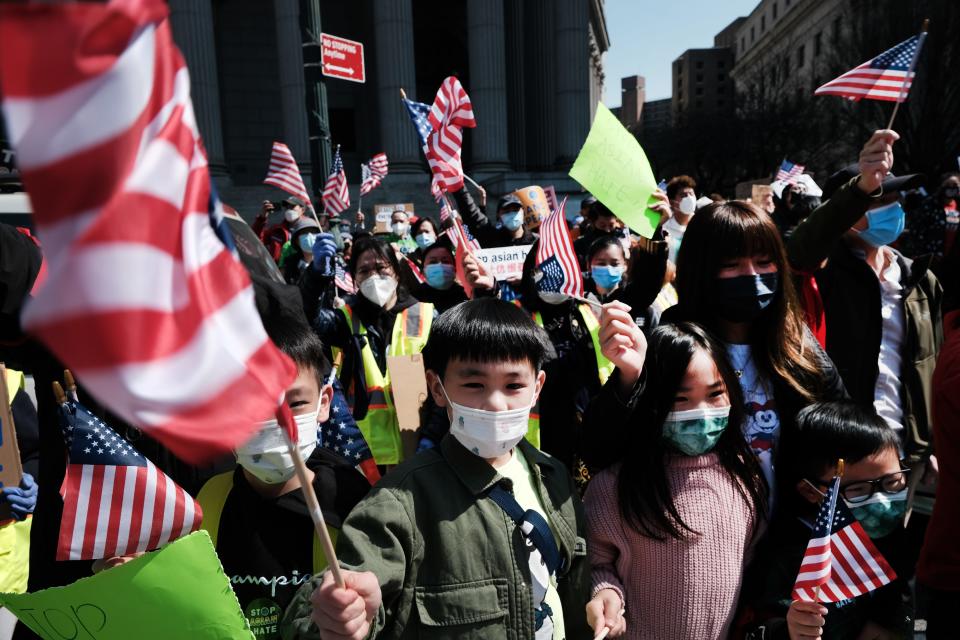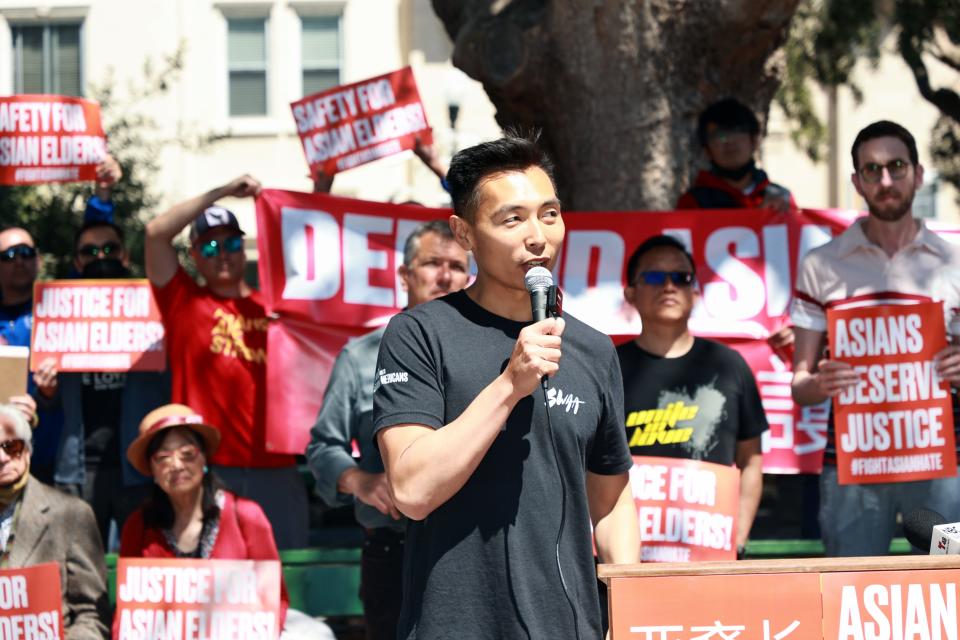'No safe spaces': For Asian Americans, California shootings add to growing mental health crisis
As it does every year, San Francisco senior services agency Self-Help for the Elderly is marking the Lunar New Year by offering its mostly Asian American clients good tidings, special pastries and traditional red envelopes bearing wishes of good health, peace and prosperity.
But this year's mood has been marred by Saturday’s massacre in Monterey Park, a predominantly Asian American community near Los Angeles where 11 older people – ranging from 57 to 76 years old – were fatally shot at a dance ballroom. Anni Chung, the organization's CEO, said she is worried about the shooting's mental and emotional effects on her seniors.
“Like everyone else, they’re glued to any sort of news on the massacres, and that in itself is not healthy,” she said. “I worry that if they don’t take themselves away that it's all going to sink in, and they will get very sad and very scared.”
In the wake of the tragedy and several years of collective trauma endured by the Asian American community, Chung and other advocates said they are worried that recent mass shootings and attacks are creating mental health trauma for many Asian Americans. And they fear many people most in need either won't pursue help or won't be able to access proper care.

Many Asian Americans grapple with mental health woes
Saturday's rampage took place as Monterey Park was marking its first Lunar New Year celebration since before the pandemic. Then a second mass shooting Monday left seven people dead in Half Moon Bay, California, further exacerbating the trauma. The victims were identified as Latino and Asian American farm workers.
On Twitter, U.S. Rep. Grace Meng, D-N.Y., wondered whether a better mental health services system could have prevented the violence.
“We don’t know motives yet, but I wonder how things could’ve been different had there been a strong mental health and social service network,” Meng wrote. “Yes, it’s about gun safety laws, yes, it’s about stopping Asian hate, but also a generation of #AAPI elders with a life of unaddressed trauma.”
Charissa Cheah, a professor of psychology at the University of Maryland, Baltimore County, said research shows that mental well-being can be damaged by both acts of violence personally experienced or those vicariously experienced through media or otherwise. With both having risen in recent years for Asian Americans, the community’s collective mental health has suffered, she said.
Stop AAPI Hate, a San Francisco-based organization formed during the COVID-19 pandemic to combat and gather data about rising anti-Asian hate, has tallied more than 11,000 reports of anti-Asian American and Pacific Islander hate incidents since it began tracking such data in March 2020.
The violence affecting the community has included six Asian women killed in Atlanta spa attacks in March 2021 and four Sikhs killed with four other victims in a mass shooting at an Indianapolis FedEx facility in April 2021, as well as a series of viral videos showing Asian seniors being assaulted without cause on city streets.
Asian Americans unlikely to seek mental health care
Compared to Americans of other racial and ethnic backgrounds, Asian Americans are least likely to get mental health treatment and three times less likely than their white counterparts, according to a 2015 report from the Substance Abuse and Mental Health Services Administration.
Reasons include language issues, a lack of culturally relevant and integrated care, cultural stigmas attached to seeking mental health assistance, cost and other systemic barriers. More than half of Asian Americans and Native Hawaiians/Pacific Islanders 65 and older have limited English proficiency, according to the National Alliance on Mental Illness, and community members are less likely to seek care out of fears of what neighbors might think or of bringing shame to their parents.
“The stigma against mental health, high financial costs and a shortage of mental health professionals with language and cultural expertise are just some of the many barriers to accessing mental health care,” Cheah said. “These barriers were present before the pandemic but the need for such services, and the workload for mental health providers, have increased exponentially.”

Language barriers can stop Asian Americans from getting medical services
Manjusha Kulkarni, executive director of AAPI Equity Alliance, an advocacy agency based in Los Angeles, said the stigma among Asian Americans surrounding mental health care echoes attitudes felt more broadly across the general population.
"More than stigma, there are issues around accessibility," Kulkarni said. "Most health care plans have minimal coverage for mental health services, and sometimes they farm them out to other entities. For those who are limited English-speaking, how do they navigate that and the lack of culturally literate providers?"
Kulkarni, who also teaches at the University of California, Los Angeles, said students had told her that campus counseling services featured few, if any, Asian American therapists.
"They're all older white women, and while they may have a strong understanding of cognitive behavioral therapy, they have a very limited understanding of the issues students brought to them," Kulkarni said. "If you have thousands of solely white providers who speak only English, that's the barrier I'm worried about."
Some Asian Americans fear they are being targeted
At Self-Help for the Elderly, Chung said some of her clients had expressed fears of what they see as a gun-happy society and the societal pressures affecting those in their community. The organization has 10 senior centers throughout the California Bay Area.
"In general, our elderly are scared of anyone attacking them unprovoked," she said. "They feel they have not harmed anybody – so why are they being beaten up, stabbed and murdered?”

Over time, she said, such fears and self-imposed isolation can lead to depression and loss of appetite.
“That’s a real worry,” she said. “The lucky ones have senior centers or clubs, but those who might be handicapped or too frail, or who have no support from family, are isolated. If they don’t reach out and aren’t associated with an existing program, it’s hard for us to know who and where they are.”
Mass shootings create feelings of trauma
Anne Saw, an associate professor of psychology at DePaul University in Chicago, said when news of the Monterey Park shooting first broke, many in the community worried it was yet another act of anti-Asian racism.
“That speaks to its pervasiveness, when the first thought is, ‘It must be this,’” she said.
The gunman, identified as Huu Can Tran, 72, was found Sunday in a white van, dead of a self-inflicted gunshot wound.
Discovering that the perpetrator was Vietnamese American offered little comfort.
“A mass shooting is a traumatic event whether it’s racially motivated or not,” Saw said.
Asian American gunmen targeted community members
In a way, the fact that the suspect was Asian American was more unsettling, said Kulkarni, whose agency compiled a list of mental health and other resources available to the community after the Monterey Park shootings. While the crime wasn’t anti-Asian in the traditional sense, it still targeted community members; the perpetrator knew it was Lunar New Year and knew that hundreds of people would be out.
Before, “the threats felt like they were coming from the outside," she said. "Now they feel like they’re coming from inside.”
In the Half Moon Bay attacks, the shooter was also Asian American. Chunli Zhao, 67, was taken into custody as the suspect in that crime.
'No safe spaces' for Asian Americans
Richelle Concepcion, past president of the Asian American Psychological Association, said there is a growing belief in some Asian American communities "that there are truly no safe spaces for our communities,” she said. “Places that used to be sources of joy are now associated with immense grief."

Stop AAPI Hate issued a statement in the wake of the shootings saying the incidents had compounded the pain, fear and trauma felt by the Asian American community over the last several years.
"We have long dealt with multiple forms of hate and violence, coming from outside, within and among our communities," the statement read. "The identity of the shooters in both of these recent massacres does not and should not delegitimize or diminish our pain and fear. We don’t know the motivations behind these shootings, and we may never know. But unfettered access to guns turned both of these acts of violence into massacres."
Fighting back can improve mental health
Russell Jeung, an Asian American studies professor at San Francisco State University, said one silver lining is that the growing anti-Asian climate of the last several years has prompted more people to stand up to the problem, from local efforts like chaperone services for seniors to broader pushes for social change. Such actions, he said, can also help address mental health struggles.
"The community is pretty fierce in finding collective strength. And the collective strength is what enables it to bounce back and soldier on,” he said.
Mental health resources
Asian American Psychological Association
National Council of Asian Pacific Americans
APA resources for coping with mass shootings, understanding gun violence
AAPI Community Mental Health Resources in the Los Angeles Area
Asian Americans Advancing Justice Southern CA
This article originally appeared on USA TODAY: Anti-Asian violence causing a mental health crisis for Asian Americans

 Yahoo Movies
Yahoo Movies 